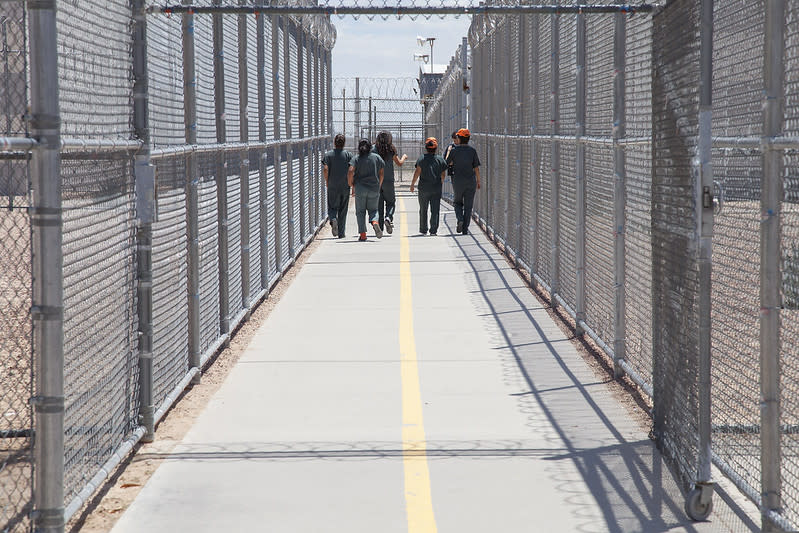High abuse rates against LGBTQ, HIV-positive people in immigration detention, study finds

Immigrants in ICE detention at the Eloy Detention Center in Arizona. (Photo credit: ICE)
LGBTQ and HIV-positive people locked up in immigration detention centers are experiencing high rates of sexual assault, harassment and threats, according to a report released last month.
The report, which was based on interviews with dozens of people who have been held by a federal immigration agency, found that nearly all of them had experienced some type of abuse based on their sexual orientation or HIV status, leading its authors to call for a dramatic reduction in the use of immigration detention.
According to one of the report’s authors, immigration facilities in Louisiana — which has among the highest populations of detainees in the country — have some of the highest rates of abuse in the country.
The findings confirm “what voluminous studies have previously shown – [the U.S. Department of Homeland Security] is incapable of safely detaining LGBTQ/H people,” the report’s authors wrote. “The government’s continued use of this abusive detention system, which operates with impunity and puts vulnerable people in physical and psychological danger, is inexcusable.”
Three immigrants rights organizations – Immigration Equality, National Immigrant Justice Center and Human Rights First – interviewed 41 people who had been held in an immigration detention center at some point between 2009 and 2023. All identified as LGBTQ. Seventeen of them had HIV.
The survey found that 16, or 40% of people interviewed, had been sexually or physically assaulted while in detention. Two others reported witnessing an assault of another LGBTQ detainee.
In some cases, reports of assaults were met with indifference. One interviewee highlighted in the report — a transgender woman identified as Leona who was housed in a Florida facility — was placed in a men’s detention unit where her cellmate repeatedly abused and harassed her. Leona reported the abuse to guards and asked to be moved, according to the report, but the request was ignored. Later, she said her cellmate attempted to rape her.
Most detainees — 85% — interviewed reported experiencing verbal and nonverbal abuse, including homophobic, transphobic or racist remarks and threats of violence while in federal custody. In most cases, the report says, the remarks came from facility staff.
Nearly half of the participants were placed in solitary confinement, often as a safety measure. Many had their sexual orientations, gender identities or confidential medical information disclosed without their consent. Roughly two-thirds of the participants reported receiving poor medical care or not receiving care when they asked for it. And 13 out of the 17 interviewees living with HIV said they were either denied medical HIV treatment or experienced some form of medical neglect.
“No human being should be held there,” said a transgender woman, identified as Zoe, to interviewers when asked about her time in federal immigration custody.
Officials with U.S. Immigration and Customs Enforcement and Customs and Border Patrol did not respond to requests for comment by Wednesday (July 3).
GET THE MORNING HEADLINES DELIVERED TO YOUR INBOX
Report recommends more releases
One of the report’s author’s Bridget Crawford, director of law and policy at Immigration Equality, said the abuses and mistreatment highlighted in the report only lead to compounded trauma for LGBTQ and HIV-positive immigrants, as most of them have already fled persecution and violence in their countries of origin and are seeking asylum in the United States.
“We want people to understand the types of violence that we see among our clients. They include high levels of sexual assault … torture, death threats.” Crawford said. “And then they come to the U.S. and they’re put in immigration jails where they experience more homophobic abuse and mistreatment.”
Liza Doubossarskaia, a staff attorney at Immigration Equality who works with LGBTQ and HIV positive immigrants in detention and a co-author of the report, added that clients she speaks with express a “sense of betrayal” when they are met with more abuse once inside the U.S. immigration detention system.
The report recommends prioritizing LGBTQ and HIV-positive asylum seekers for immigration parole rather than placing them into detention while their cases are being considered.
According to a 2018 analysis of federal data the Center for American Progress (CAP) found that LGBTQ people in immigration detention were 97 times more likely to be sexually victimed than non-LGBTQ people.
LGBTQ and HIV positive migrants have some of the strongest claims to asylum, as they can provide evidence that they face persecution in their home countries due to their perceived sexual orientations, gender identities or HIV positive status. Crawford said roughly 99% of Immigration Equality’s asylum seeking clients are granted some form of protection in the U.S..
The U.S. government can release them to their communities to go through the asylum process. Instead many LGBTQ and HIV positive immigrants are placed in environments where the risk of harassment or abuse is high and the only way to offer them protection is to place them in extended solitary confinement, which can be isolating and psychologically damaging.
Doubossarskaia said she often speaks with transgender women who have been placed in male facilities, where they complain of experiencing different forms of aggression and abuse from other detainees. When they ask for alternative housing they are commonly placed in isolation – where they are in a cell on their own for the majority of the day.
High levels of abuse in Louisiana, report author says
Crawford said Immigration Equality had seen “some of the highest levels of abuse” of detainees in Louisiana.
One detainee referenced in the report, identified as Vicky, filed a complaint in 2023 with oversight bodies within the Department of Homeland Security, while she was being housed at Pine Prairie ICE Processing Center in Louisiana. The complaint said she was repeatedly told that her only options were to either stay in a cisgendered men’s dorm or to be placed in isolation.
That facility claimed to have adopted a set of transgender care guidelines from a 2015 memorandum authored by U.S. Immigration and Customs Enforcement. The memo advised limiting solitary confinement and establishing transgender housing units in detention facilities, but the report said facilities continue to overuse isolation as a way to safely house transgender detainees.
The transgender care memo also advised field office directors,who oversee immigration detention facilities, to “consider whether the use of detention resources is warranted” and to consider “all relevant factors in this determination, including whether an individual identifies as transgender.” Doubossarskaia said she has experienced a reluctance by ICE field offices to release LGBTQ detainees who have complained of abuse.
This is most frequently the case, she said, in the New Orleans ICE Field Office, which oversees immigration detention centers in five states, including Mississippi and Louisiana, where the bulk of the region’s facilities are located. Louisiana became a hub for immigration detention under the Trump administration and now has the second largest detained immigrant population in the United States, behind Texas.
Doubossarskaia said two recent Immigration Equality clients were allegedly injured while in ICE custody within the New Orleans field office – one by another detainee and another while being transported between facilities. Both men had strong claims to asylum, and later won their cases, and sponsors willing to take responsibility for them. Still the New Orleans field office director would not release the men.
This article first appeared on Verite News and is republished here under a Creative Commons license.

The post High abuse rates against LGBTQ, HIV-positive people in immigration detention, study finds appeared first on Louisiana Illuminator.

